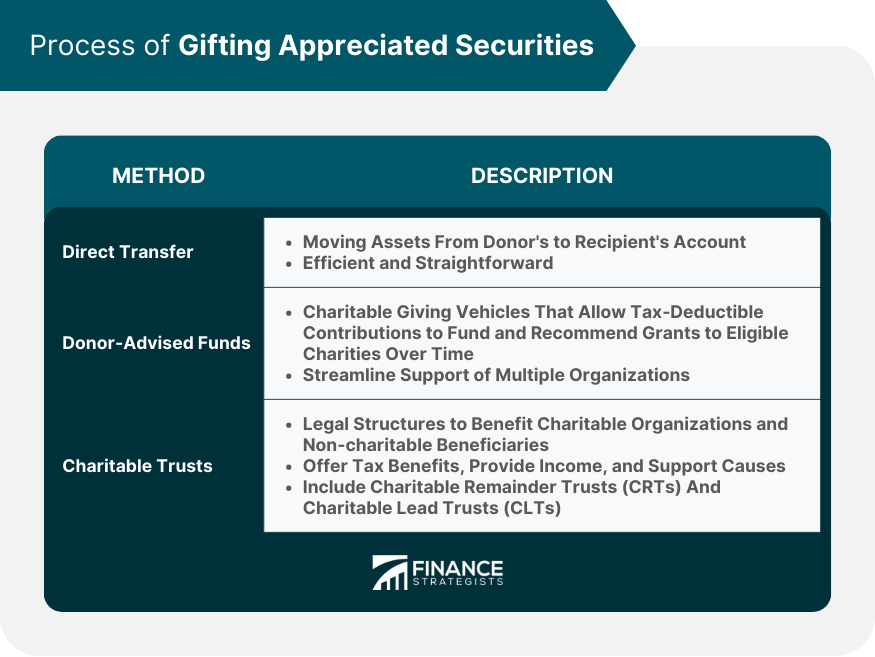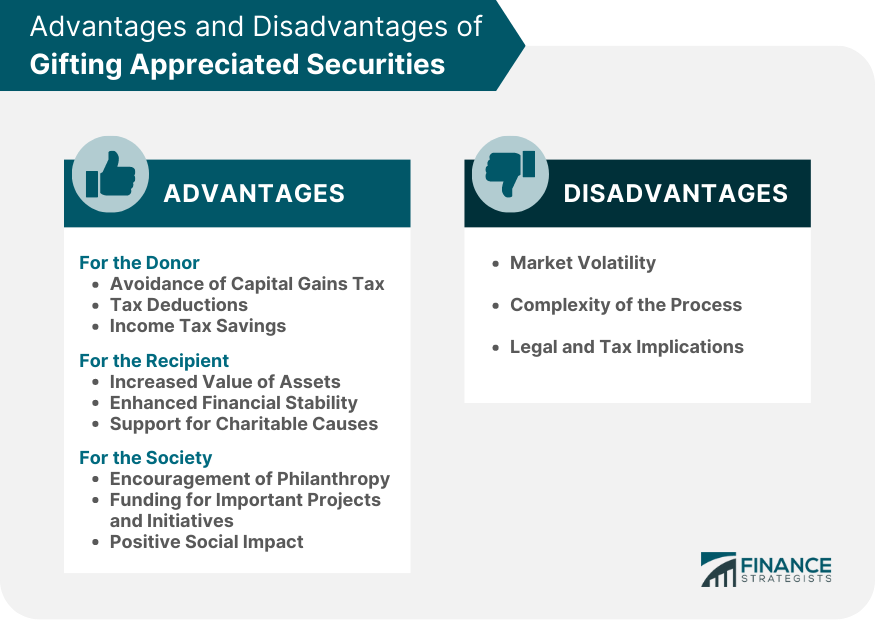Gifting appreciated securities is a process of transferring financial assets, such as stocks, bonds, mutual funds, or exchange-traded funds (ETFs), to another individual or charitable organization. This strategy is a popular way to support charitable causes or share wealth while potentially receiving significant tax benefits. Appreciated securities refer to assets that have increased in value over time, and gifting them can provide benefits for both the donor and the recipient. This financial strategy promotes philanthropy and contributes to the betterment of society by supporting various projects and initiatives. Gifting appreciated stocks is a popular way to transfer wealth, as stocks can grow in value over time. This growth can result from company performance, market trends, or dividends reinvested in the stock. Gifting appreciated stocks allows the recipient to benefit from the increased value without incurring the capital gains tax that would apply to selling the shares. Bonds are debt securities issued by governments, corporations, or other entities to raise funds. When the market interest rates decline, the value of existing bonds may appreciate. Gifting appreciated bonds can provide the recipient with a stable income stream while also offering potential tax benefits to the donor. Mutual funds are investment vehicles that pool money from multiple investors to purchase a diverse range of securities. The value of a mutual fund's shares can appreciate over time due to market performance and the success of its underlying investments. Gifting appreciated mutual fund shares can be a tax-efficient way to transfer wealth and provide the recipient with a diversified investment portfolio. Exchange-traded funds are investment funds that trade on stock exchanges like individual stocks. Similar to mutual funds, ETFs can appreciate in value due to market performance and the success of their underlying investments. Gifting appreciated ETF shares can offer the recipient a cost-effective and tax-efficient way to access a diversified investment portfolio. Determining the right recipient is crucial when gifting appreciated securities. Individuals and charitable organizations are common recipients, with each offering unique benefits and considerations for the donor and recipient. Gifting appreciated securities to individuals can be a tax-efficient way to transfer wealth to family members or friends. The recipient can benefit from the increased asset value and potentially avoid the capital gains tax that would be incurred if the donor sold the shares and gifted cash. Donating appreciated securities to charitable organizations can provide significant tax benefits for the donor while supporting the organization's mission. The charity can sell the securities without incurring capital gains tax, allowing them to use the full value of the gift for their programs and services. The process of gifting appreciated securities can vary depending on the type of recipient and the specific financial assets involved. Direct transfer, donor-advised funds, and charitable trusts are common methods for gifting appreciated securities. A direct transfer of appreciated securities involves moving the assets from the donor's account to the recipient's account. This method can be efficient and straightforward, but it may require coordination between financial institutions and the completion of specific forms. Donor-advised funds (DAFs) are charitable giving vehicles that allow donors to make a tax-deductible contribution to the fund and recommend grants to eligible charities over time. Gifting appreciated securities through a DAF can provide tax benefits for the donor while streamlining the process of supporting multiple charitable organizations. Charitable trusts, such as charitable remainder trusts (CRTs) and charitable lead trusts (CLTs), are legal structures designed to benefit both charitable organizations and non-charitable beneficiaries. Gifting appreciated securities through a charitable trust can offer tax benefits, provide income for beneficiaries, and support charitable causes. Understanding the legal and tax implications of gifting appreciated securities is essential for donors to maximize the benefits of their gifts. The gift tax, capital gains tax, and tax deductions are critical considerations when gifting appreciated securities. When gifting appreciated securities to individuals, the donor may be subject to gift tax if the value of the gift exceeds the annual gift tax exclusion. However, this tax can be minimized or avoided by structuring the gift strategically and utilizing the lifetime gift tax exemption. One of the primary benefits of gifting appreciated securities is the potential avoidance of capital gains tax. The donor does not realize capital gains when gifting the securities, and the recipient may avoid or defer the tax depending on their individual circumstances and the type of recipient. Donors who gift appreciated securities to qualified charitable organizations may be eligible for tax deductions based on the fair market value of the securities. This can lower the donor's taxable income and provide additional tax savings, further incentivizing philanthropic giving. Gifting appreciated securities can offer numerous financial benefits for the donor, including avoidance of capital gains tax, tax deductions, and income tax savings. These benefits can make gifting appreciated securities a tax-efficient way to transfer wealth or support charitable organizations. By gifting appreciated securities instead of selling them, donors can avoid realizing capital gains on the transfer. This allows the donor to pass on the full value of the appreciated assets to the recipient without incurring capital gains tax liability. When gifting appreciated securities to a qualified charitable organization, donors may be eligible for tax deductions based on the fair market value of the gifted assets. These deductions can reduce the donor's taxable income, providing additional tax savings and incentivizing philanthropy. In some cases, gifting appreciated securities can result in income tax savings for the donor. For example, if the donor is subject to a high marginal income tax rate, the tax savings from the charitable deduction can be significant, further enhancing the financial benefits of the gift. The recipient of appreciated securities, whether an individual or a charitable organization, can benefit from increased asset value, enhanced financial stability, and support for charitable causes. When receiving gifted appreciated securities, the recipient benefits from the increased value of the assets without incurring the capital gains tax that would be applicable if the donor had sold the assets and gifted the cash proceeds. Appreciated securities can provide the recipient with enhanced financial stability by diversifying their investment portfolio and potentially generating income through dividends or interest. This can be particularly beneficial for recipients facing financial challenges or seeking to achieve specific financial goals. Charitable organizations that receive appreciated securities as gifts can use the full value of the assets to fund their programs and services. This allows them to further their mission and make a more significant impact on the causes they support. Gifting appreciated securities can have broader societal benefits, including the encouragement of philanthropy, funding for important projects and initiatives, and positive social impact. The tax benefits associated with gifting appreciated securities can incentivize donors to support charitable organizations, fostering a culture of philanthropy and generosity. This can lead to increased giving and a greater sense of community engagement. When appreciated securities are gifted to charitable organizations, they can use the funds to support critical projects and initiatives that address social, environmental, and economic challenges. This can lead to meaningful change and improvements in the lives of those affected by these issues. The act of gifting appreciated securities can create a positive social impact by encouraging others to engage in philanthropic giving and supporting organizations that work to address pressing challenges. This collective effort can contribute to the betterment of society as a whole. Market volatility can present a risk when gifting appreciated securities. The value of the gifted assets may fluctuate, potentially reducing the benefits for both the donor and the recipient. It is essential to consider market conditions and consult with financial professionals before gifting appreciated securities. The process of gifting appreciated securities can be complex and may require coordination between multiple parties, including financial institutions and legal professionals. This complexity can create challenges for donors and recipients, potentially resulting in delays or unexpected issues during the transfer process. Understanding the legal and tax implications of gifting appreciated securities is crucial for both donors and recipients. Failing to consider these implications can result in unintended consequences, such as gift tax liability or reduced tax benefits. It is essential to consult with tax and legal professionals to ensure compliance with relevant laws and regulations. Gifting appreciated securities involves transferring financial assets such as stocks, bonds, mutual funds, or exchange-traded funds (ETFs) to another individual or charitable organization. It can provide significant financial benefits for the donor, such as tax deductions, avoidance of capital gains tax, and income tax savings. For the recipient, it can mean increased asset value, financial stability, and support for charitable causes. However, there are potential risks and drawbacks, such as market volatility, the complexity of the gifting process, and legal and tax implications, that must be considered before making a decision. By understanding the different types of appreciated securities, choosing the right recipient, and consulting with financial and legal professionals, donors can maximize the benefits of their gifts and make a positive impact on society.What Are Gifting Appreciated Securities?
Types of Appreciated Securities for Gifting
Gifting Appreciated Stocks
Gifting Appreciated Bonds
Gifting Appreciated Mutual Funds
Gifting Appreciated Exchange-Traded Funds (ETFs)

How to Gift Appreciated Securities
Choosing the Right Recipient for Gifting Appreciated Securities
Gifting to Individuals
Gifting to Charitable Organizations
Process of Gifting Appreciated Securities
Direct Transfer of Appreciated Securities
Donor-Advised Funds for Gifting Appreciated Securities
Charitable Trusts and Appreciated Securities

Legal and Tax Considerations for Gifting Appreciated Securities
Gift Tax Implications
Capital Gains Tax Implications
Tax Deductions for Gifting Appreciated Securities
Advantages of Gifting Appreciated Securities
Financial Benefits for the Donor Through Gifting Appreciated Securities
Avoidance of Capital Gains Tax
Tax Deductions
Income Tax Savings
Benefits for the Recipient of Appreciated Securities
Increased Value of Assets
Enhanced Financial Stability
Support for Charitable Causes
Societal Benefits of Gifting Appreciated Securities
Encouragement of Philanthropy
Funding for Important Projects and Initiatives
Positive Social Impact
Potential Drawbacks and Risks of Gifting Appreciated Securities
Market Volatility and Gifting Appreciated Securities
Complexity of the Gifting Process for Appreciated Securities
Legal and Tax Implications of Gifting Appreciated Securities

Final Thoughts
Gifting Appreciated Securities FAQs
Gifting appreciated securities offers several benefits for both the donor and recipient. For the donor, it can result in the avoidance of capital gains tax, potential tax deductions, and income tax savings. For the recipient, it can lead to increased asset value, enhanced financial stability, and support for charitable causes.
Yes, when gifting appreciated securities to qualified charitable organizations, donors may be eligible for tax deductions based on the fair market value of the gifted assets. This can reduce the donor's taxable income and provide additional tax savings, incentivizing philanthropic giving.
Gifting appreciated securities to individuals can be more tax-efficient than gifting cash. The recipient benefits from the increased value of the assets without incurring the capital gains tax that would be applicable if the donor had sold the assets and gifted the cash proceeds.
There are potential risks and drawbacks, such as market volatility, which can affect the value of the gifted assets, and the complexity of the gifting process, which can create challenges for donors and recipients. Additionally, legal and tax implications must be considered to avoid unintended consequences.
To make informed decisions about gifting appreciated securities, donors should educate themselves about the process, weigh the potential benefits and drawbacks, and consult with tax and legal professionals. This can help maximize the positive impact of these gifts on the recipients and society as a whole.
True Tamplin is a published author, public speaker, CEO of UpDigital, and founder of Finance Strategists.
True is a Certified Educator in Personal Finance (CEPF®), author of The Handy Financial Ratios Guide, a member of the Society for Advancing Business Editing and Writing, contributes to his financial education site, Finance Strategists, and has spoken to various financial communities such as the CFA Institute, as well as university students like his Alma mater, Biola University, where he received a bachelor of science in business and data analytics.
To learn more about True, visit his personal website or view his author profiles on Amazon, Nasdaq and Forbes.











